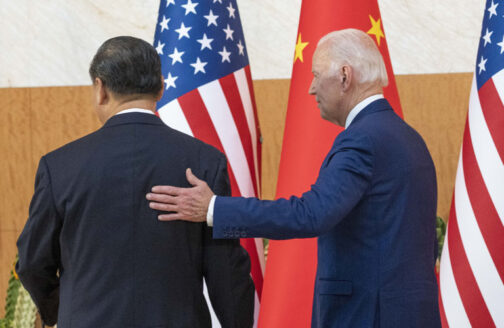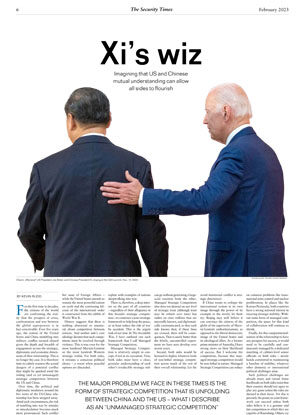Xi’s wiz
 Charm: offensive? US President Joe Biden and Chinese President Xi Jinping at the G20 summit, Nov. 14, 2022.
Charm: offensive? US President Joe Biden and Chinese President Xi Jinping at the G20 summit, Nov. 14, 2022.
Credit: picture alliance / REUTERS | Ricardo Arduengo
Imagining that US and Chinese mutual understanding can allow all sides to flourish
For the first time in decades, the citizens of the world are confronting the reality that the prospect of crisis, confrontation and war between the global superpowers is in fact conceivable. Even five years ago, the notion of the United States and China stumbling into military conflict seemed absurd given the depth and breadth of engagement across the strategic, diplomatic and economic dimensions of their relationship. This is no longer the case. It is therefore time to calmly reassess the actual dangers of a potential conflict that might be sparked amid the roiling (and as yet unmanaged) strategic competition between the US and China.
Over time, the political and diplomatic insulation around the live wires of the US-China relationship has been stripped away. Amid such circumstances, the risk of tumbling into war by mistake or miscalculation becomes much more pronounced. Such conflict – even if it were to start modestly – could rapidly escalate into a catastrophic situation for both parties, their allies and the world at large.
Despite the fatalism of some commentary, I do not accept that crisis, conflict and war are inevitable. For this reason, I have titled my recent book The Avoidable War. I continue to believe that neither side intends to go to war with the other. And yet, for the decade ahead, we see a real (and growing) risk of unintentional crisis, conflict, escalation and war. Fundamentally, this is because both countries are locked into a new form of strategic competition for regional, and eventually global, supremacy. China seeks the “great rejuvenation” of its nation – for more on that, see my article for the November-December issue of Foreign Affairs – while the United States intends to remain the most powerful nation on earth and the continuing fulcrum of the international order it constructed from the rubble of World War II.
History suggests that there is nothing abnormal or unnatural about competition between nations. And neither side’s core ideology dictates that such competitions must be resolved through violence. This is true even for the most hardened Marxist-Leninist or the most hawkish Western strategic realist. For both sides, it remains a conscious political choice – a resort when peaceful options are discarded.
In my analysis, the major problem we face in these times is the form of strategic competition that is unfolding between China and the US – what I describe as an “unmanaged strategic competition.” There are no rules, no guardrails. The daily rhythm is one where each side pushes and shoves, trying to put their country in a position of advantage relative to where they began. In the absence of some mutually agreed restraints, this type of superpower competition runs the risk of degenerating into violence. Just muddling through in the view that serious incidents won’t arise (or, if they do, the players will always de-escalate before it’s too late) is not a smart option. The stakes are simply too high, and history is replete with examples of nations sleepwalking into war.
There is, therefore, a deep interest on the part of all countries – regardless of their allegiance in this broader strategic competition – to construct a joint strategic framework to help keep the peace, or at least reduce the risk of war by accident. This is the urgent task of our time. In The Avoidable War, I have outlined one such framework that I call Managed Strategic Competition.
Managed Strategic Competition is relatively simple in concept, if not in its execution. First, both sides must have a clear, granular understanding of each other’s irreducible strategic redlines. They must conclude rationally that enhancing strategic predictability advantages both countries, that strategic deception is counterproductive, and strategic surprise is just plain dangerous. And they must build guardrails into the relationship that can absorb shocks and reduce the risk of overreach, miscommunication and misunderstanding.
This process is not easy. It will require hard, direct conversations and firm resolve. But it serves both nation’s core interest in ensuring strategic stability, and the prosperity that comes with it. Certainly, it does more to advance that outcome than the alternative of push-and-shove, as each side places their bets on how far they can go without generating a large-scale reaction from the other. Managed Strategic Competition also does not depend on any level of strategic trust (although trust may be rebuilt over time) but rather on clear redlines that are internally known, and diplomatically communicated, so that each side knows that, if these lines are crossed, there will be consequences. That is surely better than the febrile, uncontrolled experiment we have seen develop over recent years.
Second, both sides would be licensed to deploy whatever tools of non-lethal strategic competition across much of the rest of their overall relationship. Let the United States and China channel their strategic rivalry into a competitive race to enhance their economic and technological prowess, their foreign policy influence, and even their military capabilities (since, over the longer term, the mechanism that will most likely avoid intentional conflict is strategic deterrence).
If China wants to reshape the international system in its own image through the power of its example to the world, let them try. Beijing may well believe it can convince the citizens of the globe of the superiority of Marxist-Leninist authoritarianism, as opposed to the liberal democratic image of the United States and its ideological allies. As a former prime minister of Australia, I have strong views on their likelihood of success. But I welcome the competition, because this managed strategic competition would be non-lethal in nature. Managed Strategic Competition can reduce the risk of armed conflict, rather than luring either side to roll the dice on dangerous wars with unpredictable results.
Third, this framework could create the political and diplomatic space needed for strategic cooperation between the United States and China where they have aligned national interests, including on pressing global challenges. These include climate change, nuclear non-proliferation, global financial stability, researching treatments for common scourges like cancer and laying the groundwork to better manage (or even prevent) the next pandemic. After all, even at the height of the Cold War, the United States and Soviet Union were able to carve out space for collaboration on common problems like transnational arms control and nuclear proliferation. In places like the Korean Peninsula, both countries have a strong national interest in ensuring strategic stability. Without some form of managed competition, the space for this kind of collaboration will continue to shrink.
Finally, for this compartmentalization of the relationship to have any prospect for success, it would need to be carefully and continuously managed by a dedicated matching of cabinet-level senior officials on both sides – steady hands committed to maintaining a baseline of stability, whatever other domestic or international political challenges arise.
Such political challenges are already many and varied. Some hardheads on both sides insist that their country should not agree to play any game unless the rules are skewed in their favor. Yet this is precisely the point; no joint framework can succeed unless both sides believe it is a genuine and fair competition in which they are capable of flourishing. Others cry “appeasement,” but this is false; the bedrock of this framework is pragmatic, realistic deterrence that keeps both sides in check.
The next few years will be pivotal to determining whether we can sidestep the path to superpower conflict. When I first put forward Managed Strategic Competition before the pandemic, it was intended as a starting point to inform an evolving discussion. As that conversation has continued, various elements akin to Managed Strategic Competition have been adopted into the foreign policy conversations of both sides (although I claim no particular credit or influence in that). On both sides, it seems the conclusion that a managed competition – as opposed to the alternative – has taken root. This work must continue.
Kevin Rudd is a former prime minister of Australia and is set to become the Australian ambassador to the US in March. He is the author of several books, most recently The Avoidable War: The Dangers of a Catastrophic Conflict between the US and Xi Jinping’s China published in 2022.




